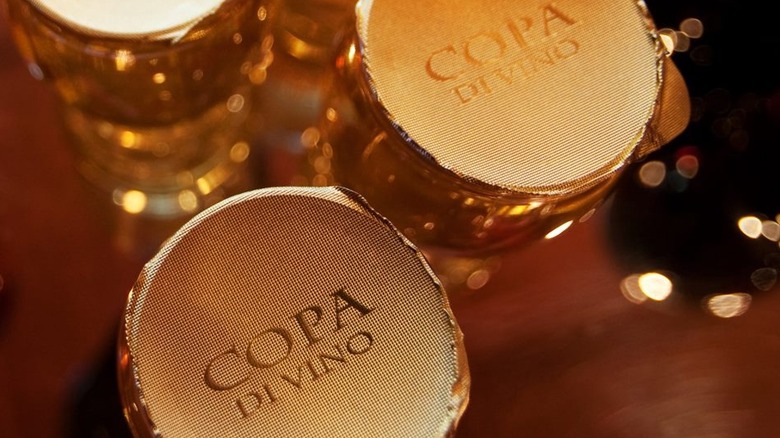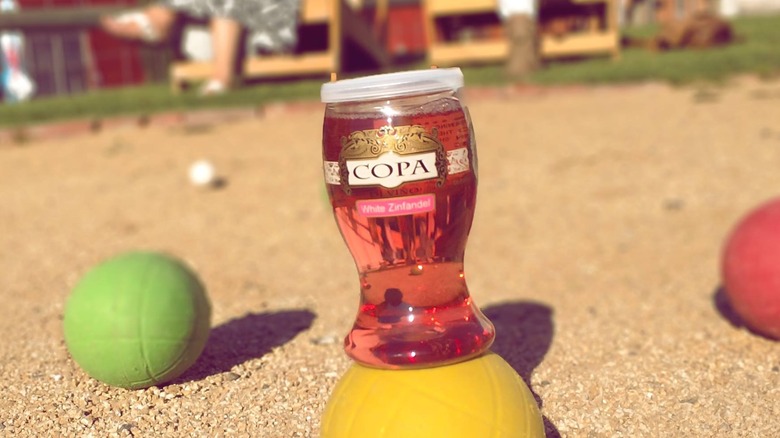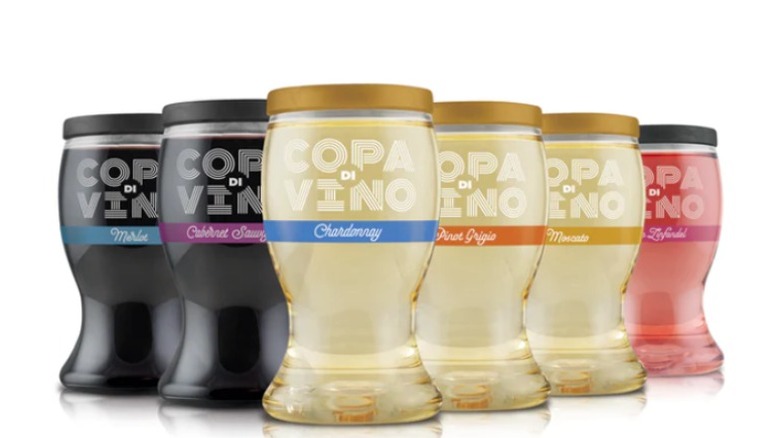Where Is Copa Di Vino From Shark Tank Today?
Wine glass preferences vary, but if you're on the go, a standard wine glass or corked bottle probably won't suffice. That's why Copa Di Vino invented a particular kind of single-serve wine that can easily be sold and enjoyed in various venues. The story of Copa Di Vino extends further out than that and involves revitalizing a small town that has long been home to founder James Martin's family. Even so, the most valuable aspect of this brand has long been its packaging, at least, according to the Sharks on "Shark Tank."
Martin first appeared on Season 2 Episode 1 of the show, sharing, "I hope to be the first entrepreneur to actually come back and be a Shark," but his pitch didn't exactly go well. He offered 20% equity in his company for a $600,000 investment. Unfortunately, the Sharks weren't interested in his premium wine, and most of them declined. Only Kevin O'Leary was willing to make a deal: $600,000 for 51% of the intellectual property. Yet, Martin felt the business was worth more as a total package. No deal was struck.
"I am going to go buy a thousand-dollar bottle of wine tonight," O'Leary declared, "and I'm going to drink it because I'm weeping for the opportunity you lost." He planned to drown his tears in wine and then black out the memory from his mind. Surprisingly, though, Mr. Wonderful and the other Sharks did end up thinking about Martin's offer for a second time, just one season later.
Was the second time the charm?
Martin never returned as a Shark, but he was the first contestant to ever pitch on "Shark Tank" for a second time, during Season 3 Episode 11. Copa Di Vino had continued to build its brand; but to keep up with demand, Martin needed capital. So, he offered 5% for $300,000 — a higher valuation than the Sharks initially declined. Sweetening the deal, Martin brought a thousand-dollar wine for the Sharks to drink if they reached an agreement.
Daymond John and Barbara Corcoran didn't like his attitude, so both bowed out. Eventually, though, O'Leary joined forces with Mark Cuban and Robert Herjavec to offer a combined $600,000 for 30% equity. Martin stalled for time, sipped his expensive wine, and offended two Sharks in the process. Cuban backed out, Herjavec walked offstage, and O'Leary was left without a deal. "I won't be back," Martin proclaimed.
The following year, Martin told Oregon Wine Press that his TV appearance helped Copa Di Vino grow in popularity with other investors. Consequently, the company secured millions of dollars in financial backing. Sales also increased into the millions, with the brand selling throughout dozens of states. "The exposure's been phenomenal," Martin commented and tellingly admitted he never expected to get a deal on the show. He was mostly there for the free publicity, which allowed Copa Di Vino to triple production, move into a remodeled facility, and grow its own grapes. Did such a strangely roundabout strategy pay off long-term?
Who acquired Copa Di Vino?
The palpable tension between Martin and the Sharks is anything but water under the bridge. In 2017, ABC News spoke with both the Copa Di Vino founder and the stars of "Shark Tank." Martin claimed, "We all know the Sharks blew it and missed out on the biggest opportunity they ever had." He also revealed he harbored a hatred for O'Leary and went on the show a second time "to get the last word in and say, 'Look, you blew it, but I'm also gracious enough to give you a second chance.'"
O'Leary still admitted the packaging was a good concept, but he thought Martin's winery was simply bad business. Corcoran stated she felt disrespected and had no respect for Martin in return. Similarly, Cuban said Martin tried too hard to appear sophisticated, while Herjavec believed Martin needed to know his place. So, any hopes Martin had of returning as a Shark were dashed.
Splash Beverage Group, Inc., though, did want to deal with Martin and the sales that Copa Di Vino was doing throughout stores, hotels, and arenas. As reported by Newsfile, the Splash Beverage corporation acquired Copa Di Vino in 2021. "The acquisition adds a remarkable revenue stream to Splash's bottom line," the group's CEO explained. Included in this deal was, of course, the proprietary packaging technology that O'Leary so desperately desired. Martin may not have left a good impression on "Shark Tank" either time, but he certainly did benefit from free publicity.


